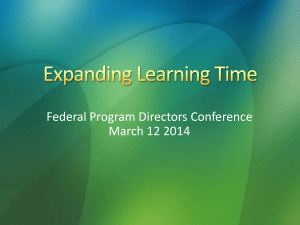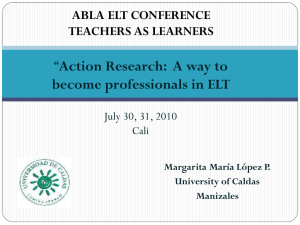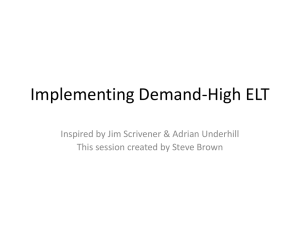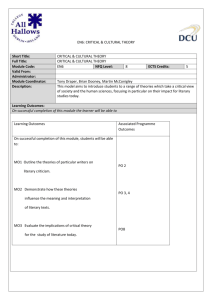2015 05Newsletter
advertisement
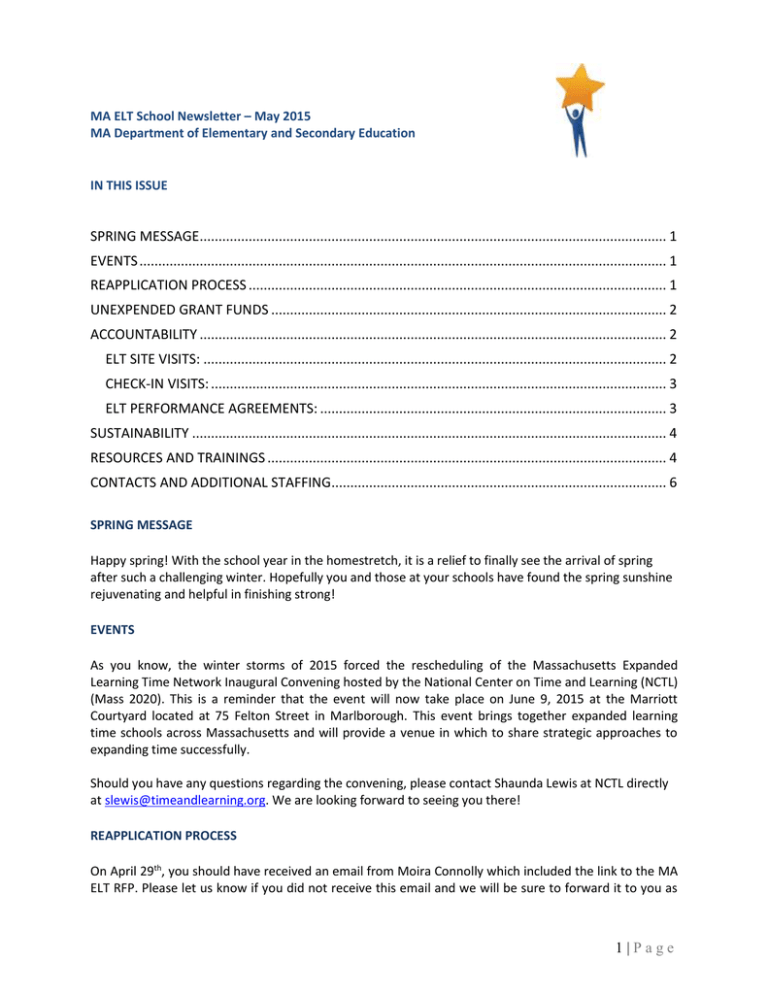
MA ELT School Newsletter – May 2015 MA Department of Elementary and Secondary Education IN THIS ISSUE SPRING MESSAGE............................................................................................................................ 1 EVENTS ............................................................................................................................................ 1 REAPPLICATION PROCESS ............................................................................................................... 1 UNEXPENDED GRANT FUNDS ......................................................................................................... 2 ACCOUNTABILITY ............................................................................................................................ 2 ELT SITE VISITS: ........................................................................................................................... 2 CHECK-IN VISITS: ......................................................................................................................... 3 ELT PERFORMANCE AGREEMENTS: ............................................................................................ 3 SUSTAINABILITY .............................................................................................................................. 4 RESOURCES AND TRAININGS .......................................................................................................... 4 CONTACTS AND ADDITIONAL STAFFING......................................................................................... 6 SPRING MESSAGE Happy spring! With the school year in the homestretch, it is a relief to finally see the arrival of spring after such a challenging winter. Hopefully you and those at your schools have found the spring sunshine rejuvenating and helpful in finishing strong! EVENTS As you know, the winter storms of 2015 forced the rescheduling of the Massachusetts Expanded Learning Time Network Inaugural Convening hosted by the National Center on Time and Learning (NCTL) (Mass 2020). This is a reminder that the event will now take place on June 9, 2015 at the Marriott Courtyard located at 75 Felton Street in Marlborough. This event brings together expanded learning time schools across Massachusetts and will provide a venue in which to share strategic approaches to expanding time successfully. Should you have any questions regarding the convening, please contact Shaunda Lewis at NCTL directly at slewis@timeandlearning.org. We are looking forward to seeing you there! REAPPLICATION PROCESS On April 29th, you should have received an email from Moira Connolly which included the link to the MA ELT RFP. Please let us know if you did not receive this email and we will be sure to forward it to you as 1|Page soon as possible. If you would like to access the RFP, it has been posted on our web site and can be found at http://www.doe.mass.edu/grants/2016/225/. It is important to remember that MA ELT is funded through a line item in the state budget, and funding is subject to legislative appropriation each year. Although the budget process typically wraps up late in the school year, we have posted the Request for Proposals (RFP) for reapplications, with proposals due on Friday, June 5, 2015. Please note that no award will be final until the FY16 budget has been passed and the amount available funding is certain. Although there is a blank budget workbook that can be found in the documents attached to the RFP, final SIMS data is not yet available, nor has the budget cycle completed. Please refrain from filling out the budget workbook until you receive one that is specific to your district and schools from Moira Connolly. In reading over the RFP and the documents attached to it, you may notice a change in the language on the “Total Annual Hours” worksheet. Due to the need for clarity around the additional time that must be provided for students at MA ELT schools, we have decided on a minimum number of hours for elementary schools at 1365 and 1425 for the middle/high schools. If you have been participating in the MA ELT initiative prior to June, 2014, but do not meet these minimum requirements, please contact Moira Connolly at 781-338-3216. UNEXPENDED GRANT FUNDS Please be reminded that funding is subject to annual budget appropriation, which means there is always the possibility that the legislature will terminate ELT funding or cut a portion of the funding. For this reason it is imperative that all funds allocated to districts/schools be expended completely in order to demonstrate the need for, at minimum, level funding. Failure to expend all ELT funds allocated makes it difficult to advocate for funding in the future. Given the economic climate, schools receiving this performance-based grant need to be strategic and meticulous in spending. Should you realize that you will not be spending your entire allocation by or before June 30, 2014, you are expected to notify us immediately and well before the end of the school year. Should you anticipate returning FY15 funds we strongly encourage you to develop a plan to spend down your grant funding, whether by amending your budget and reallocating funds to another budget line, or by reallocating funds for summer activities with Department approval. Should funds be returned, the amount will likely factor negatively into your allocation for the next fiscal year, particularly if the line item is reduced. Funds cannot be carried over into the next fiscal year. If you need to amend your budget, please contact Moira Connolly immediately and she will send an amendment-ready workbook to you and guide you through the process. ACCOUNTABILITY ELT SITE VISITS: We have nearly completed our full ELT Site Visits to Cohort II schools, which include: Boston Arts Academy, Boston Silvia (North End) Elementary School, Fall River Greenfield Middle School, Greenfield Newton Elementary School, Greenfield Ferryway School, Malden 2|Page City View Discovery School, Worcester Site visits are one of the means by which the Department documents each ELT school’s performance and progress over time, corroborating and augmenting the information reported each year in the school’s reapplication within the context of its ELT Performance Agreement. Equally important, the visits enhance the Department’s understanding of ELT program strengths and challenges, and provide an opportunity to offer feedback to schools as well as inform statewide technical assistance. We thank the schools that have already hosted our visits, as well as those volunteers who have been so generous with their time and expertise in serving on site visit teams. CHECK-IN VISITS: Half-day check-in visits are designed to gather some observational and qualitative evidence regarding the schools’ implementation of expanded time and provide feedback, although on a more limited basis than for full site visits. We have had the opportunity to conduct several check-in visits thus far, and have been impressed with each school’s implementation of ELT, continuous self-reflection, and corollary refinement of the use of time. ELT PERFORMANCE AGREEMENTS: Cohort I schools and all four of our new schools have signed and submitted new ELT Performance Agreements. While performance measures can be challenging to develop, hopefully they provide each school an opportunity to reflect on progress to date and to create a meaningful road map for success over the next three years. As a recap, performance agreements inform funding decisions and are one of the means by which the Department monitors each school’s implementation and outcomes. Due to the high demand across the state for limited ELT funds through line item 7061-9412, coupled with the ongoing emphasis on outcomes, expectations for schools currently receiving this funding are correspondingly high. As you know, ELT funds provided through state budget line item are intended to be used to effectively leverage time to improve student performance. While the term for performance agreements will continue to be three years, each will be reviewed on an ongoing basis, and when concerns arise, the Department will require schools to meet prescribed annual benchmarks in order to retain grant funding. The following changes to the ELT Performance Agreements are in effect this academic year for all Cohort I and for all redrafting cohorts going forward: If a school’s academic performance causes significant concern based on sustained performance below expectations or more precipitous short-term losses, we will inform the Commissioner. The Commissioner then may place a school on notice of academic conditions that must be met in successive years in order to retain funding under the grant, regardless of the point in the three-year cycle of the school’s performance agreement. As in the past, at the end of the third year of implementation of any ELT Performance Agreement, a funding determination will be made for schools with expiring performance agreements. This determination will be made based on student performance data, qualitative evidence of high quality ELT implementation primarily gathered via site visits, and success in meeting ELT Performance Agreement measures. As always, continued funding during the 3|Page performance agreement period is subject to completing a reapplication annually as well as annual appropriations by the Legislature. Schools new to the initiative have drafted new performance agreements, setting three-year goals, as all other cohorts have done, and can expect to have the full first three-year cycle to meet their stated goals. SUSTAINABILITY Since the inception of the MA ELT initiative in 2006, the Commonwealth has invested over $119,466,180.00 in grant funding for districts and schools expanding time. With 22 schools and many ELT veterans among them, the Legislature has asked the Department to take stock and report on models that provide good return on investment. In its request for a report, the Legislature casts an eye toward both affordability and assessing the cost of creating opportunity for additional schools and districts to offer more time for their students and educators (FY15 legislative language). In order to provide a robust response, the Department, in partnership with the National Center on Time & Learning, conducted focus groups and interviews with ELT stakeholders. All participants were generous, candid, and invested in sharing successes, challenges, and ideas to inform the future of ELT. The result of this work is now complete and the report was emailed to all ELT district and school leaders on April 2nd and can now be found on our web site at: http://www.doe.mass.edu/research/reports/2015/03ELT-Sustainability.pdf. Thanks to all who have participated in this important conversation. If you would like additional information, please feel free to contact, Kathy Cross, our TIME Collaborative Coordinator. RESOURCES AND TRAININGS INSTRUCTION: We are fortunate to have a number of resources accessible through our website here at the Department. In this newsletter, we would like to highlight some resources that can be found on our Curriculum and Instruction page that you and your teachers may find helpful and informative: On the Curriculum and Instruction Center home page, there is a menu of options from which to choose, including Common Core State Standards, Professional Development, Model Curriculum, and a variety of other helpful menu options. That page can be found at: http://www.doe.mass.edu/candi/.. By clicking on the “Model Curriculum” option in the menu, teachers will find a number of model curriculum units that have been developed for teachers, by teachers. The model curriculum link can be found at: http://www.doe.mass.edu/candi/model/. Teachers choosing the menu option “MA Teachers’ Domain” will automatically link to PBS LearningMedia, a partnership between PBS and WGBH. This site allows educators to browse by standard and click on the statement within that standard that they are most interested in addressing. It will then link to a number of frequently updated resources that teachers may find helpful and engaging. It also allows educators to filter by grade and subject. There is a plethora of material on this site, so all are encouraged to navigate the site comprehensively for what is 4|Page most useful. Those interested in accessing this website may do so through the teachers’ domain or at the following: http://www.pbslearningmedia.org/ . CURRICULUM TRAINING: The Building Aligned Curriculum Training is an opportunity for districts to better align existing curriculum to the state frameworks by implementing new curriculum units. The training, on June 17 and 18 in Westford, will prepare teacher leaders to work with teams of teachers to adapt and implement model curriculum units (MCUs). The program is designed to: Increase teacher leaders' ability to guide a team through planning, adapting, and implementing frameworks-aligned curriculum by using or adapting one or more of ESE's model curriculum units; Increase teachers' ability to use data to modify curriculum to address students' needs and districts' priorities; Connect instructional changes with educator evaluation; and Prepare teacher leaders to facilitate and review a pilot of a new curriculum unit. Teacher leaders will leave the training with the knowledge to successfully customize, pilot, and revise a new curriculum unit. This training, similar to the assistance provided in the Building Aligned Curriculum Grant (Fund Code 133), is open to all districts, with priority given to districts designated Level 1 or 2. Registration is limited to two teacher leaders per district. For more information, please contact Sarah Churchill Silberman, 781-338-3586 or Karen White, 781-3383588. SERVICE LEARNING TRAINING: Get Started with Service-Learning (2-days) Thursday, June 25th and Friday, June 26th (8:30-3:30 both days) Holiday Inn and Suites, Marlborough Register Here (by June 22nd) The 2-day Get Started with Service-Learning sessions are designed to prepare participants to implement a high quality service-learning project using KIDS Consortium’s award winning service-learning model. Participants will leave with tools, strategies and enthusiasm to implement a SL project in their school and community. At this 2-part session, participants will: •Understand the difference between the KIDS model of SL and other community-oriented educational experiences; •Understand the importance of community partnership(s), student ownership, and connections to learning objectives that define KIDS service-learning projects; •Be impelled to incorporate SL into their teaching environment(s); •Advocate for SL based on the impacts it has on students, teachers, and communities; and •Learn tools and strategies to: (a) identify a high-quality SL project, (b) create a plan to incorporate SL into their classroom environment; and (c) implement a high-quality SL project for diverse learners. These sequential days are designed to prepare participants to implement a high quality servicelearning project using KIDS Consortium’s award winning service-learning model. Participants will leave with tools, strategies and enthusiasm to implement a SL project in their school and community. 5|Page The session is free of charge. Participants must commit to attending both days. SPECIAL EDUCATION: Many ELT schools serve large populations of students on the autism spectrum. The following is information regarding proposed licensure endorsement in autism: Autism Endorsement Regulations Open for Public Comment: The Board of Elementary and Secondary Education (Board) has issued proposed regulations to establish a teacher license endorsement in autism for Massachusetts licensed teachers. The proposed regulations are available online, and the Board welcomes public comment. Written comments may be submitted by mail to: Sarah Whitman, SEPP, Department of Elementary and Secondary Education, 75 Pleasant Street, Malden, MA 02148; by fax to 781-338-3371; or by e-mail to: swhitman@doe.mass.edu. RESEARCH: In July, 2014, the Institute for Strategic Leadership and Learning (INSTLL) completed a three year analysis of turnaround practices for the Massachusetts Department of Elementary and Secondary Education. You may find many of the successful practices outlined in this report helpful and validating. If you are interested in reading the report, you may find it through our web site at the following link: http://www.doe.mass.edu/apa/sss/turnaround/2014PracticesReport.pdf Our Office of Planning and Research has a number of helpful data tools available on our website. The role of the Office of Planning and Research is “to provide analysis, research, and tools to inform decision-making and to support high quality planning and implementation for ESE's highest priority initiatives”. With this mission in mind, some resources that serve to support research and data-based decisions can be found at http://www.doe.mass.edu/research/resources/tandr.html. We encourage you to browse that portion of our website for data tools and a variety of reports on timely educational issues in Massachusetts. COMMISSIONER’S MESSAGE: We also encourage you to keep abreast of key updates from the Department by reading the Commissioner’s Weekly Message each Friday. CONTACTS AND ADDITIONAL STAFFING As always, we are happy to hear from you with any questions, concerns, or requests for clarification. Please remember that we are also available to answer questions during the summer months, should you need assistance. For inquiries regarding MA ELT: Moira Connolly, Education Specialist for ELT; 781-338-3216; mconnolly@doe.mass.edu Patrick Buckwalter, ELT Program Specialist; 781-338-3208; pbuckwalter@doe.mass.edu Kathy Cross, TIME Collaborative Coordinator; 781-338-3231; kcross@doe.mass.edu For inquiries regarding the TIME Collaborative and sustainability issues: 6|Page Kathy Cross, TIME Collaborative Coordinator; 781-338-3231; kcross@doe.mass.edu For inquires regarding MA ELT or the TIME Collaborative and sustainability issues: Ruth Hersh, Assistant Director; 781-338-3211; rhersh@doe.mass.edu 7|Page
